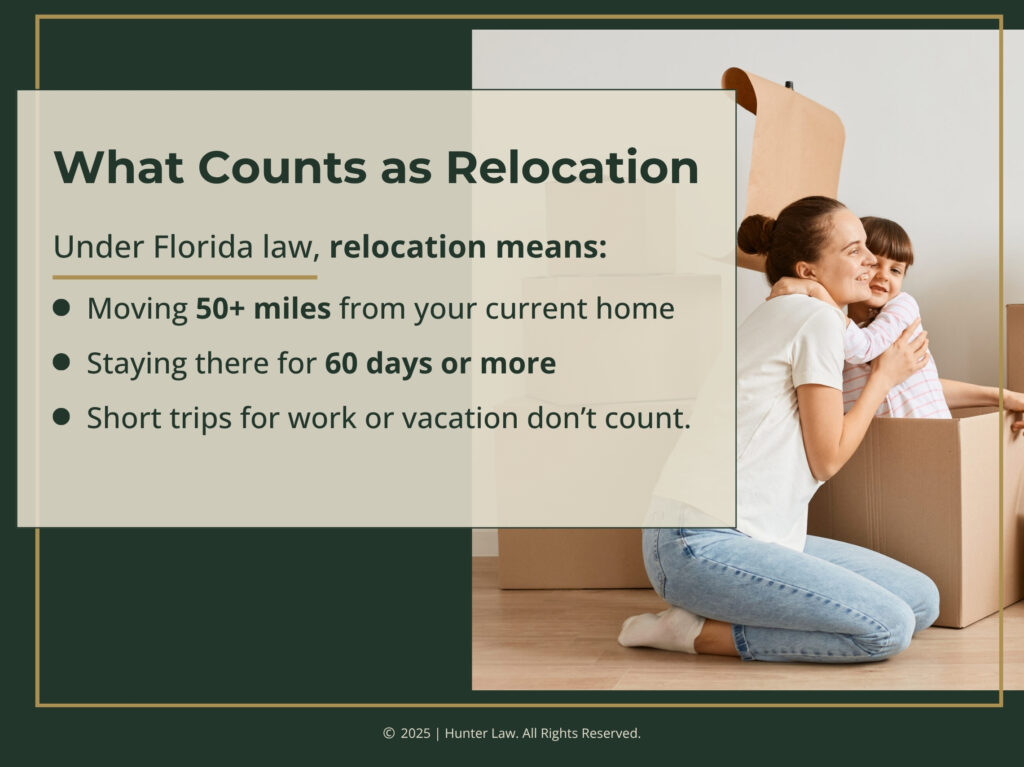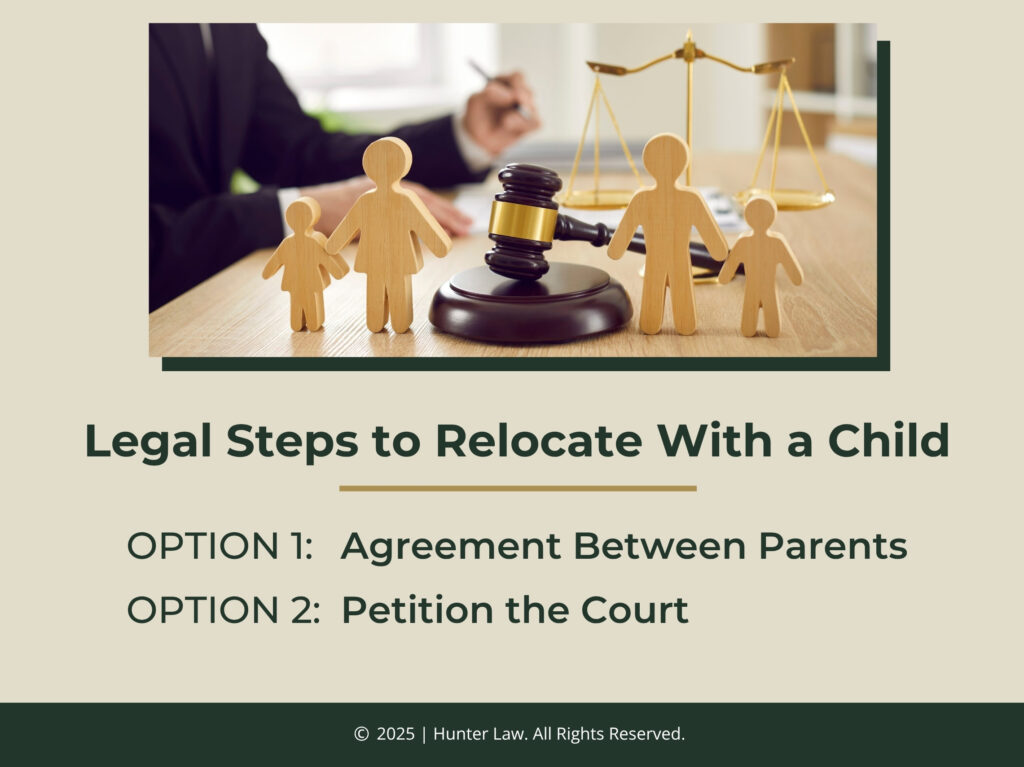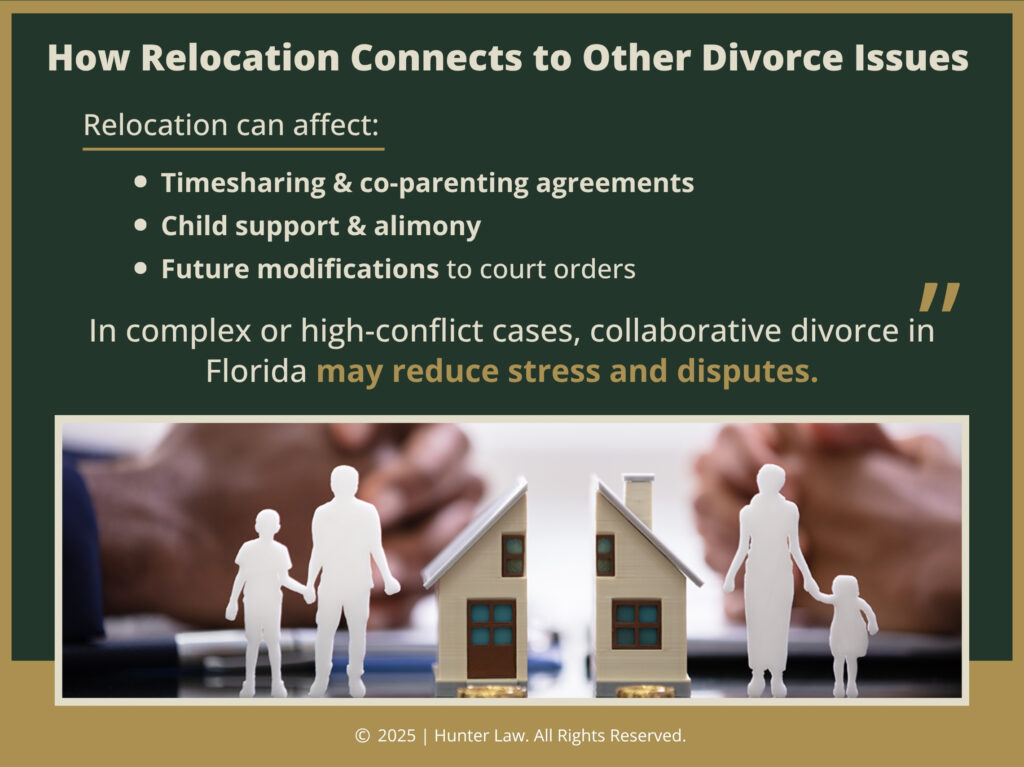Relocating with a child after divorce in Florida is a common concern for parents who need to move for work, family support, or a fresh start. In Tampa and throughout Florida, family law courts handle relocation cases with one principle in mind: the best interests of the child. This article explains the legal steps you must take, how courts make decisions, and practical tips to help you navigate the process. If you find yourself in this situation, Hunter Law Group in Tampa is here to guide you. Call (813) 287 2227 or contact our team today to discuss your options, protect your rights as a parent, and gain peace of mind knowing that you have experienced professionals supporting you through every stage of the relocation process.
What Counts as Relocation Under Florida Law?
Florida law defines relocation as moving more than 50 miles from the current residence for at least 60 consecutive days. Short trips for vacations, medical care, or temporary work assignments do not qualify as relocation. It’s also important to note that Florida law no longer uses the term “custody.” Instead, relocation affects timesharing and parental responsibility. This distinction is important because Florida courts strive to ensure that both parents remain actively involved in the child’s life, even if one parent relocates.
Understanding this legal framework helps parents plan ahead and avoid mistakes that could affect their case. For additional resources about how Florida courts operate in family matters, you can also visit the official Florida Family Courts page.
Judges have described relocation cases as some of the most difficult matters that parents can present to the court for a ruling.

The Legal Steps to Relocate With a Child After Divorce in Florida
Option 1: Written Agreement
If both parents agree to the relocation, they can sign a co-parenting agreement. This agreement must include details such as:
- The new address and reason for the move
- A revised timesharing schedule
- Plans for transportation and communication
Option 2: Petitioning the Court
If the parents cannot agree, the parent wishing to move must file a petition with the court. The petition must include:
- The new address and the reason for the move
- A proposed timesharing plan
- Details about transportation arrangements
- An explanation of how the move will impact the child’s school, community, and overall well-being
- A copy of the job offer, if the relocation is based on a change in employment
- Other specific information and specific statutory language as detailed in Fla. Stat. §61.13001.
How Florida Courts Decide Relocation Requests
Courts in Tampa and across Florida evaluate relocation cases by focusing on what serves the child’s best interests. Judges do not look only at the desires of the parents, but instead carefully examine how a move might affect the child’s stability, relationships, and long-term opportunities. They want to ensure that the child continues to have meaningful contact with both parents while benefiting from any positive changes the move might bring. Key factors include:
- The child’s relationship with each parent (important for families concerned with fathers’ rights law)
- The child’s age, needs, and preferences, if mature enough
- Whether the move will improve the child’s education, healthcare, or living conditions
- Each parent’s history of following co-parenting agreements
- The financial ability to manage travel costs for visitation
What Happens if the Other Parent Objects?
When one parent objects to relocation, the court holds a hearing where both sides present their arguments. The judge then considers the facts and may reach different outcomes. The court may approve the relocation with a modified timesharing plan, deny the relocation request, or adjust support orders, such as alimony or child support, to cover the new travel expenses. In Tampa, judges carefully review the reasons behind the move, the impact on the child’s daily life, and whether both parents can realistically maintain meaningful involvement. At this stage, guidance from Hunter Law in Tampa can make a significant difference in presenting a clear, persuasive case.
Common Challenges in Relocation Cases
Parents often face difficulties such as:
- Proving that the move truly benefits the child, not just the parent
- Covering high travel costs for the non-relocating parent
- Concerns about weakening the parent-child bond
- The need to modify existing parenting or support orders
- Difficulty coordinating school and extracurricular activities across long distances
- Increased stress for children adjusting to a new environment while maintaining ties to the other parent
- Disagreements between parents over communication methods, such as phone calls or video chats
- Uncertainty about how relocation might affect existing support orders or future modifications
Practical Tips for Parents Considering Relocation
- Start discussions early; open communication can sometimes prevent conflict
- Keep records of job offers, housing options, or family support at the new location
- Suggest realistic timesharing alternatives, such as extended school-break visits or video calls
- Seek guidance from a trusted Tampa lawyer. Many families look for the best family attorney to navigate these complex cases.
How Relocation Ties Into Other Divorce Issues
Relocation often connects with broader issues after divorce, such as:
- Timesharing
- Changes in alimony and financial stability
- Adjustments to child support
- Future modifications to co-parenting agreements or timesharing schedules
- In some cases, issues such as protection orders in Florida divorce cases or handling high-conflict divorce in Tampa may also arise when parents cannot agree on relocation. Parents exploring alternatives may consider collaborative divorce in Florida as a way to reduce disputes.
Some parents look for the “best timeshare exit attorneys,” but in Florida, relocation must be handled through specific court approval rather than by simply leaving a timesharing plan.
Conclusion on Divorce in Florida Relocation
Relocating with a child after divorce in Florida is possible. Still, it requires either a signed agreement or a court order. Because the child’s best interests are the court’s priority, parents must be prepared to show how the move supports their child’s well-being. Tampa families should seek legal guidance early to avoid mistakes that could affect their case.
Call at (813) 287 2227 or Contact Hunter Law Group in Tampa to discuss your relocation questions and protect your rights as a parent.




